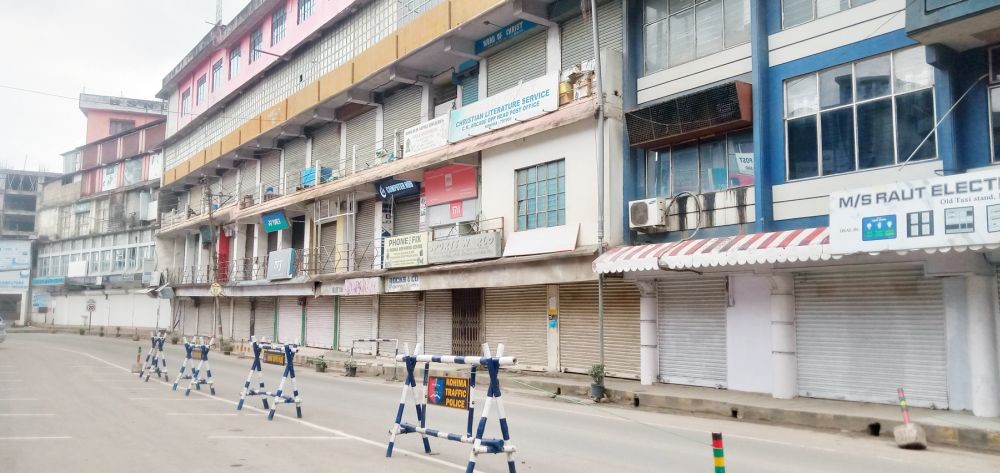The global Coronavirus pandemic has compelled churches to rethink its role and ministries and likewise, the congregations are also re-imagining the church in the midst of absence of regular worship services. (Morung Photo by Moses Hongang Chang)

Morung Express News
Dimapur | May 27
Being the church during the times of a pandemic continues to pose significant challenges and it would be impractical to assess the impact of the COVID-19 pandemic on churches.
With restriction on mass gatherings, churches are finding new ways of reaching out to congregations and shifting the existing worship to online networks. However, in a place like Nagaland, factors such as lack of internet connectivity, power supply and gadgets attributes in creating disconnect between the church and the congregations.
The global crisis has compelled churches to rethink its role and ministries and likewise, the congregations are also re-imagining the church in the midst of absence of regular worship services.
Time to reach out
One youth from a church in Dimapur shares that in such a time as this, when people are confined within the four corners of their room, most people have gone into depression.
“They are not just fighting against the virus but also fighting against loneliness, hopelessness, anxieties and stress. The church can reach out to those people and try to connect with them, pray for them, encourage them and give them hope. Hope is the need of the hour,” he asserts.
Citing practical reason like lack of smartphone, a woman from Mon district says that in the town where she lives “churches are not closed because many do not own smartphone so to have online services is next to impossible.” She adds that during church services the microphones are put loud enough “so that we hear the gospel even if we stay at home.”
However, she also suggests that the churches should reach out to those members who need counseling, especially those who face violence at home during this lockdown.
In agreement to them, Obed Aier, a Master of Theology graduate adds, “We must not limit God within the four walls of the church, but walk the extra mile to reach out. This is the time to bring the sermons preached on love, care, sharing, reaching out, faith on God, and trust on God to life by practicing it.”
For Hupeka Jakha Khujumi, community prayer is an important lifeline for church members which still remain accessible through digital platforms. According to him, churches should encourage small group family ministry, have group prayer or bible study with free apps like zoom.
Stand in the gap
“The role of the church should be to connect people first to Jesus, and also being a life-giving, caring community of believers,” opines Obed.
He says it is overwhelming to see many churches in Nagaland doing more than soul-winning, and aiding the government by running quarantine centres, giving donations, feeding the poor and hungry, and even providing their infrastructure for use in this fight against the pandemic.
“Even as the world is scrambling to make sense of the global pandemic, the body of Christ must avoid simplistic “knee-jerk reactions” to explain the reason for the Coronavirus pandemic but continue to stand in the gap with prayer and care as the primary response to the pandemic and then go out and help those at risk,” he urges.
Obed also reminds that “the church is who we are, not just a place we go” and encourages all “to come out of the comfort zone and pray about how we can all be comforter and givers who serve as the hands and feet of Jesus who we follow.”
According to Metseibino Chusi, who teaches in a private school and also closely engages in Children Ministry, “this could be one of the best times in the history of the church.” She believes that “this generation can be more kind, empathetic and become an encourager and spread positivity through actions by applying the question ‘What would Jesus do (in this situation)?”
‘Be the church’
Reflecting on the question ‘What can we expect the church to do even in the midst of absence of regular services?’ a young author and student from Kohima believes that ‘there must have been a regular member, seated at a regular church bench every passing Sunday, never missing a service for the sake of courtesy and to satisfy the human longing to be social but must have not once experienced the joy of salvation.’
“The Church (you and I) have to reach out for that particular person... We never know, now that person’s doubts in the existence of God might have surmounted with no food on table, with the loss of loved ones in the battle against the virus. That person might be anxiously fighting alone against depression. That person might be you! But the church is also in you. Reach out and seek out,” he stresses.
He also predicts that ‘very soon in our land, less division will exist due to demerits of tribalism and more division would be seen due to theism and atheism.’ Noting that, he adds that it becomes vital for churches to reach out for that one lost sheep. Not only in words but also in power for that is what the Kingdom of heaven is about.
“In that way I believe, the uncle in the neighborhood would soberly come seeking for the church, Pastor kanh sob kutey ase?” he concludes.
This is the second of a two part series.




